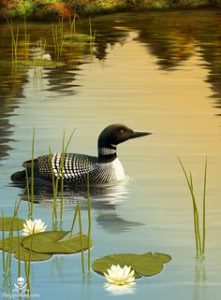 The Yogabliss, Two Rivers/RiverTree Yoga on-line Moving into Meditation classes met this morning. Our kinship has been a constant support through the troubled times we are living through. Watching the many fires that are burning is heart breaking. The time and tenderness of our practice encourages me to keep my heart open.
The Yogabliss, Two Rivers/RiverTree Yoga on-line Moving into Meditation classes met this morning. Our kinship has been a constant support through the troubled times we are living through. Watching the many fires that are burning is heart breaking. The time and tenderness of our practice encourages me to keep my heart open.
We drew more encouragement from the words and poetry of Gregory Orr. His prose was drawn from his On Being interview with Krista Tippett, Shaping Grief With Language. You can find the poem, What Was Bequeathed Us and other resources in the transcript section of this link.
We heard Mary Oliver’s heart breaking poem, Lead. Her poem about the dying loons urges us to keep our broken hearts open. Mary’s poem was drawn from Parker Palmer’s On Being blogpost, An Invitation to Heartbreak. Parker’s poem-inspired prose presents a lingering question: “What can I do day-by-day to make my heart more supple?”
Relaxed Reflection
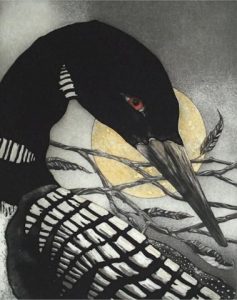 Close your eyes and turn your awareness to being . . . sense your body’s place in space and how you are connected to Earth . . . Feel your body breathing . . . Feel your heart pulsing . . . Now notice what sensations make themselves known . . . being . . . feeling . . . breathing . . . Notice the presence of any emotion . . . . . . how the feeling expresses in your body . . . . . . .Notice the mind state that may be present . . . . . . maybe a lingering thought or many mixed together . . . Being in this moment . . . feeling . . . and breathing . . . . becoming aware of all of what you are bringing to practice . . . . . . If possible let there be a tender allowing for your whole being . . .
Close your eyes and turn your awareness to being . . . sense your body’s place in space and how you are connected to Earth . . . Feel your body breathing . . . Feel your heart pulsing . . . Now notice what sensations make themselves known . . . being . . . feeling . . . breathing . . . Notice the presence of any emotion . . . . . . how the feeling expresses in your body . . . . . . .Notice the mind state that may be present . . . . . . maybe a lingering thought or many mixed together . . . Being in this moment . . . feeling . . . and breathing . . . . becoming aware of all of what you are bringing to practice . . . . . . If possible let there be a tender allowing for your whole being . . .
What is it like to give yourself this tenderness and time? Sensing what’s true takes time. Meeting what’s true takes tenderness. The truths of our time are so frightening and uncertain. We are feeling the heat of climate change, the tumult of social change and the heavy knowledge that our very survival depends on even greater change: the change of social and environmental justice. Lyric poet Gregory Orr describes our lives of uncertainty and desire for meaning:
. . . we ordinary people, in our daily lives, we experience enormous amounts of disorder and confusion. It’s inside us. It’s in our past. It’s in the unknowable future. So disorder is a part of our life. We all know that. We also know that we need order, that some kind of patterns reassure us: the sun rising, the stars and the moon, the seasons, our personal habits, which I love, the habit that reassures us about the world. And we just navigate our lives with this kind of interplay of disorder and order.
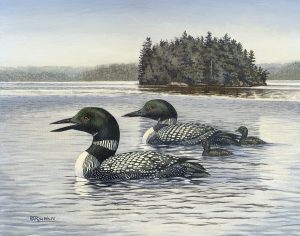 Our willingness to be present offers us a chance to become aware of how we are buffeted by the world . . . to feel compassion for the hurts we bear and the hurts we cause. The interplay of disorder and order includes having our hearts broken. Our practice is to keep our broken hearts open. Mary Oliver’s beautiful poem, Lead, is an invitation to this kind of willingness. It is a lament for the many, many beautiful birds that are poisoned by the lead fishing sinkers and weights they ingest.
Our willingness to be present offers us a chance to become aware of how we are buffeted by the world . . . to feel compassion for the hurts we bear and the hurts we cause. The interplay of disorder and order includes having our hearts broken. Our practice is to keep our broken hearts open. Mary Oliver’s beautiful poem, Lead, is an invitation to this kind of willingness. It is a lament for the many, many beautiful birds that are poisoned by the lead fishing sinkers and weights they ingest.
Lead by Mary Oliver
Here is a story
to break your heart.
Are you willing?
This winter
the loons came to our harbor
and died, one by one,
of nothing we could see.
A friend told me
of one on the shore
that lifted its head and opened
the elegant beak and cried out
in the long, sweet savoring of its life
which, if you have heard it,
you know is a sacred thing.,
and for which, if you have not heard it,
you had better hurry to where
they still sing.
And, believe me, tell no one
just where that is.
The next morning
this loon, speckled
and iridescent and with a plan
to fly home
to some hidden lake,
was dead on the shore.
I tell you this
to break your heart,
by which I mean only
that it break open and never close again
to the rest of the world.
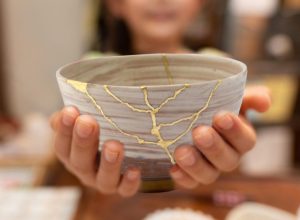 Our circle is like a big round bowl that can hold us . . . our cares, our fears, our longings, our grief and our love for the struggling world around us. We all know the Earth sounds and sights that have broken our hearts. The cries and images of dear ones live inside us: loons and songbirds, bees and butterflies, salmon and orcas, trees and waters. Our human relations of family and friends, community members and countrymen, peoples around the world come to our hearts in story after story of insecurity, struggle and loss. Teacher and author, Parker Palmer writes:
Our circle is like a big round bowl that can hold us . . . our cares, our fears, our longings, our grief and our love for the struggling world around us. We all know the Earth sounds and sights that have broken our hearts. The cries and images of dear ones live inside us: loons and songbirds, bees and butterflies, salmon and orcas, trees and waters. Our human relations of family and friends, community members and countrymen, peoples around the world come to our hearts in story after story of insecurity, struggle and loss. Teacher and author, Parker Palmer writes:
Heartbreak is an inevitable and painful part of life. But there are at least two ways for the heart to break: it can break open into new life, or break apart into shards of sharper and more widespread pain.
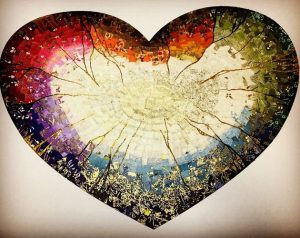 A brittle heart will explode into a thousand pieces, and sometimes get thrown like a fragment grenade at the perceived source of its pain — there’s a lot of that going around these days. But a supple heart will break open into a greater capacity to hold life’s suffering and its joy . . .
A brittle heart will explode into a thousand pieces, and sometimes get thrown like a fragment grenade at the perceived source of its pain — there’s a lot of that going around these days. But a supple heart will break open into a greater capacity to hold life’s suffering and its joy . . .
So here’s a question I like to ask myself:
What can I do day-by-day to make my heart more supple?
This is a question that can live in our hearts. We can start by opening to what is true for us right now. We continue by finding what matters most . . . What is at the heart of the matter? These living questions can help us become more open and responsive to a suffering world. Parker writes:
The broken-open heart is not restricted to the rare saint. I know so many people whose hearts have been broken by the loss of someone they loved deeply. They go through long nights of grief when life seems barely worth living. But then they slowly awaken to the fact that their hearts have become more open, compassionate, and welcoming — not in spite of their pain but because of it.
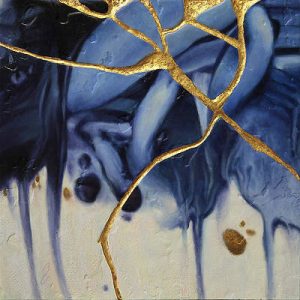 Our caring can move us out into the world . . . In sitting on the ground of what is true and what matters most our responses emerge . . . They grow into being by the way we live our lives. The simple and profound choices we make every day . . . the way we listen and speak . . . how we offer generosity and practice restraint . . . what we consume and create . . . In our practice we can consider all the ways we touch the world. We bring time and tenderness to our hearts and the hearts of others.
Our caring can move us out into the world . . . In sitting on the ground of what is true and what matters most our responses emerge . . . They grow into being by the way we live our lives. The simple and profound choices we make every day . . . the way we listen and speak . . . how we offer generosity and practice restraint . . . what we consume and create . . . In our practice we can consider all the ways we touch the world. We bring time and tenderness to our hearts and the hearts of others.
Gregory’s poem speaks to the heart of life:
This is what was bequeathed us:
This earth the beloved left
And, leaving,
Left to us.
No other world
But this one:
Willows and the river
And the factory
With its black smokestacks.
No other shore, only this bank
On which the living gather.
No meaning but what we find here.
No purpose but what we make.
That, and the beloved’s clear instructions:
Turn me into song; sing me awake.
